人教版(2019)必修 第一册Unit 5 Languages around the world Reading for writing课件(共28张PPT)
文档属性
| 名称 | 人教版(2019)必修 第一册Unit 5 Languages around the world Reading for writing课件(共28张PPT) |  | |
| 格式 | pptx | ||
| 文件大小 | 4.8MB | ||
| 资源类型 | 教案 | ||
| 版本资源 | 人教版(2019) | ||
| 科目 | 英语 | ||
| 更新时间 | 2023-10-22 21:30:37 | ||
图片预览

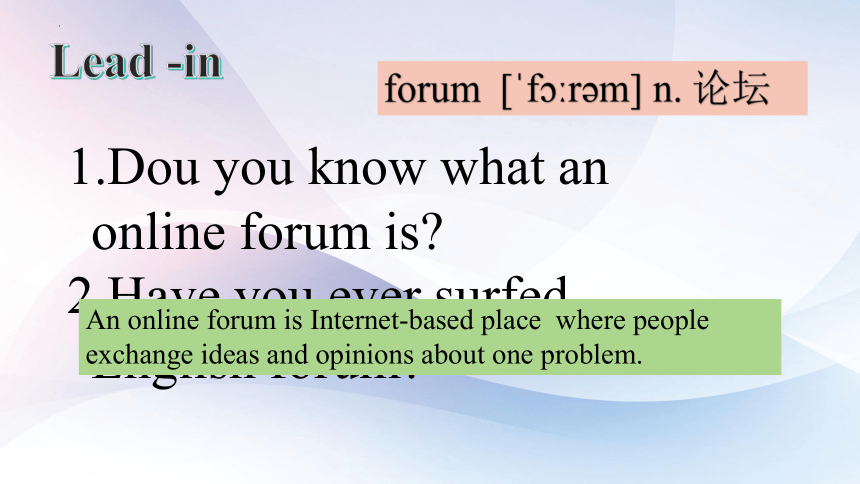
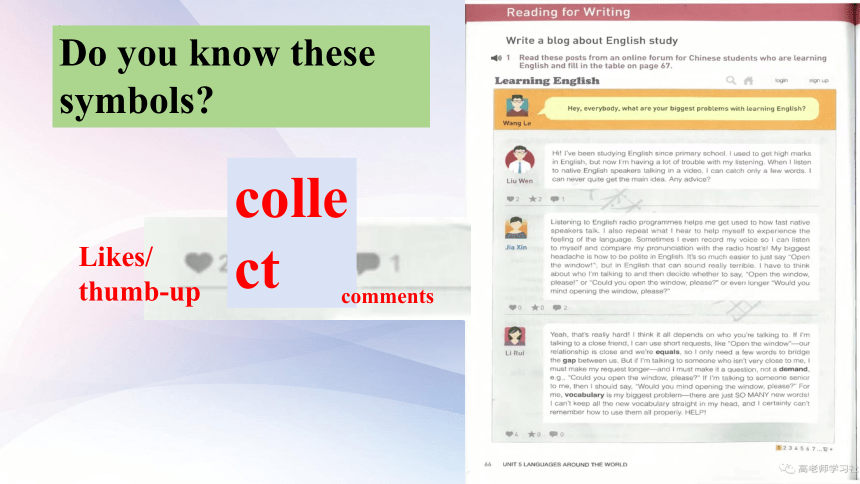
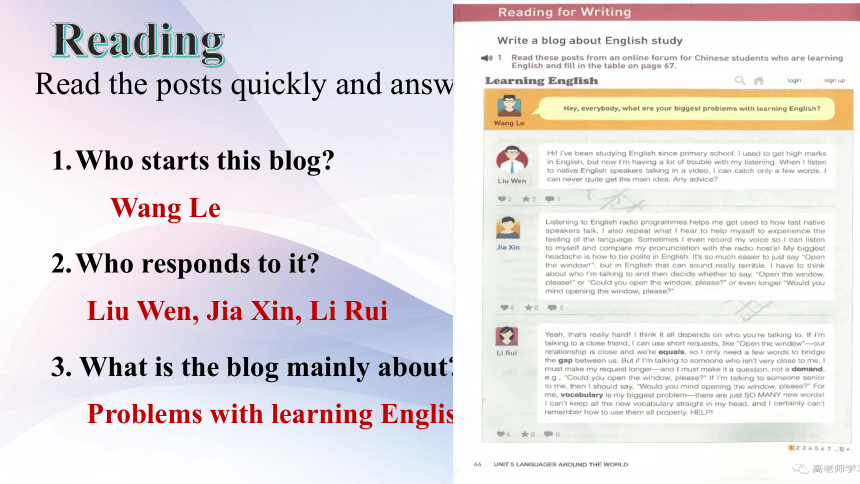
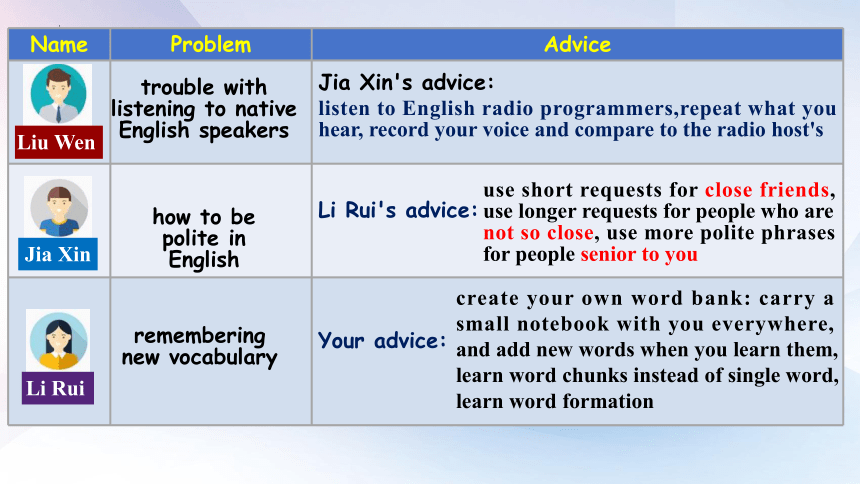
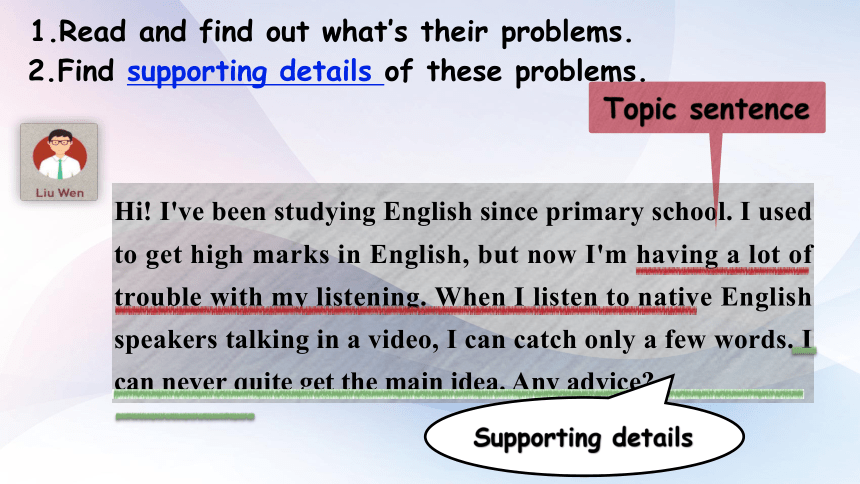
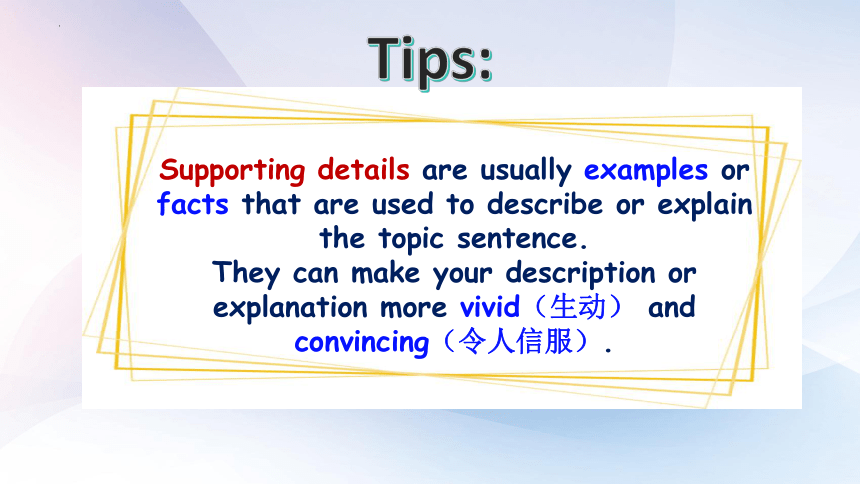
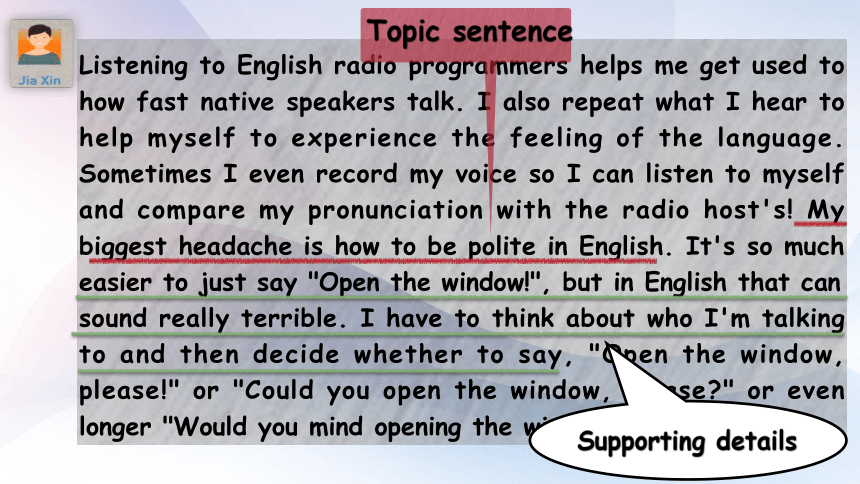
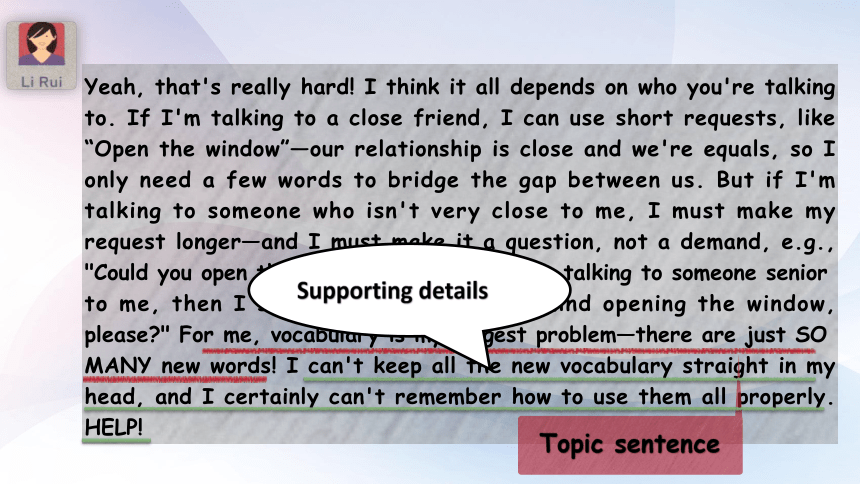
文档简介
(共28张PPT)
新人教高中英语必修一Unit5 Languages Around the world
Reading for writing
Dou you know what an online forum is
Have you ever surfed English forum
Lead -in
forum [ f r m] n. 论坛
An online forum is Internet-based place where people exchange ideas and opinions about one problem.
Do you know these symbols
collect
Likes/ thumb-up
comments
Read the posts quickly and answer the following questions.
Who starts this blog
Who responds to it
3. What is the blog mainly about
Wang Le
Liu Wen, Jia Xin, Li Rui
Problems with learning English.
Reading
Name Problem Advice
Jia Xin's advice:
listen to English radio programmers,repeat what you hear, record your voice and compare to the radio host's
Li Rui's advice:
Your advice:
Liu Wen
Jia Xin
Li Rui
trouble with listening to native English speakers
how to be polite in English
use short requests for close friends, use longer requests for people who are not so close, use more polite phrases for people senior to you
remembering new vocabulary
create your own word bank: carry a small notebook with you everywhere, and add new words when you learn them, learn word chunks instead of single word, learn word formation
Hi! I've been studying English since primary school. I used to get high marks in English, but now I'm having a lot of trouble with my listening. When I listen to native English speakers talking in a video, I can catch only a few words. I can never quite get the main idea. Any advice
1.Read and find out what’s their problems.
Topic sentence
2.Find supporting details of these problems.
Supporting details
Supporting details are usually examples or facts that are used to describe or explain the topic sentence.
They can make your description or explanation more vivid(生动) and convincing(令人信服).
Tips:
Listening to English radio programmers helps me get used to how fast native speakers talk. I also repeat what I hear to help myself to experience the feeling of the language. Sometimes I even record my voice so I can listen to myself and compare my pronunciation with the radio host's! My biggest headache is how to be polite in English. It's so much easier to just say "Open the window!", but in English that can sound really terrible. I have to think about who I'm talking to and then decide whether to say, "Open the window, please!" or "Could you open the window, please " or even longer "Would you mind opening the window, please "
Supporting details
Topic sentence
Yeah, that's really hard! I think it all depends on who you're talking to. If I'm talking to a close friend, I can use short requests, like “Open the window”—our relationship is close and we're equals, so I only need a few words to bridge the gap between us. But if I'm talking to someone who isn't very close to me, I must make my request longer—and I must make it a question, not a demand, e.g., "Could you open the window, please " If I'm talking to someone senior to me, then I should say, "Would you mind opening the window, please " For me, vocabulary is my biggest problem—there are just SO MANY new words! I can't keep all the new vocabulary straight in my head, and I certainly can't remember how to use them all properly. HELP!
Supporting details
Topic sentence
How to write a blog about your problem
Read carefully again for details
Find out the problems (topic sentences) and the supporting details in each paragraph.
Supporting details are usually examples or facts that are used to describe or explain the topic sentences. They can make your description or explanation more vivid and convincing.支持性细节通常是用于描述或解释主题句子的例子或事实。它们可以使你的描述或解释更加生动和令人信服。
How does Liu Wen express his problem
Brief introduction
Topic sentence
Supporting details
Hi! I’ve been studying English since primary school. I used to get high remarks in English, but now I’m having a lot of trouble with my listening. When I listen to native English speakers talking in a video, I can catch only a few words. I can never quite get the main idea. Any advice
ask for help求助
How do Jia Xin and Li Rui give advice
Topic sentences
Supporting details
Examples
How to write a blog about your problem
Describe the problem clearly.
Brief introduction +Topic sentences + supporting details + ask for help
2. Write one or two advice on how to solve the problem.
Topic sentences+supporting details +some examples
假如你是李华,你在网上看到李明发的帖子,他说他的英语单词记不住不好,希望得到大家的帮助,你给他回帖。
内容要点提示:
1.你以前也有类似的情况;
2.你在英语记单词方面的成功做法;
3.你在英语学习中阅读是个很头疼的问题,并请求帮助。
注意:词数80左右。
Writing Guidance
体裁
应用文
人称 第___ _____人称为主
时态
___________为主
框 架 首段:______________________________
中段:______________________________
尾段:______________________________
一
二
一般现在时
针对李明的问题记单词提出建议
自己的问题--阅读
求助
1.你以前也有类似的情况;
2.你英语记单词方面的成功做法;
3.你在英语学习中遇到的困难,并请求帮助。
Brief introduction
+Topic sentences
单词对于英语学习至关重要!如何记住单词确实也是一大挑战!
我曾经也遇到这样的问题。好在我现在进步颇多!
supporting details
Write down the new words in my notebook and carry it wherever I go.
Download some apps for learning vocabulary.
use mind-maps 思维导图
state your own problem
+ask for help
尽管我知道很多单词意思,但还是在阅读的时候不能理解全句的意思。
有何建议吗?期待你的帮助!
Brief introduction
+Topic sentences
单词对于英语学习至关重要!如何记住单词确实也是一大挑战!
我曾经也遇到这样的问题。好在我现在进步颇多!
1.单词对于英语学习至关重要!如何记住单词确实也是一大挑战!
(1) Vocabulary is very important for English learning.
Vocabulary is of great importance for English learning.
(2) How to remember the words well is really a big challenge.
2.我曾经也遇到这样的问题。好在我现在进步颇多!
I used to meet such a problem but now I make great progress in it.
supporting details
Write down the new words in my notebook and carry it wherever I go.
Download some apps for learning vocabulary.
use mind-maps 思维导图
(1)把新单词记到笔记本里随身携带
I always write down the new words in my notebook and carry it wherever I go.
(2)此外,我下载百词斩App记单词,因为它有很多单词相关的图片能够更容易记住单词
Besides,I download an app called BaiCiZhan for learning vocabulary with
which I think it’s much easier to remember the words because it has many
colorful pictures related to the words.
(3)使用思维导图是最好的记单词方式,它能帮我更好地理解并记住更多的单词。
Using mind-maps is I think the best way to remember vocabulary,which helps
me understand and remember more words.
state your own problem
+ask for help
尽管我知道很多单词意思,但有时候还是不能理解全句的意思。
有何建议吗?期待你的帮助!
1.尽管我知道很多单词的意思,但还是在阅读的时候不能理解全句的意思。
However, I have trouble with my reading.
Though I know the meanings of most words, I can’t understand the whole sentence sometimes.
2.有何建议吗?期待你的帮助!
Any advice I am eager for your help.
Hi, Li Ming! Vocabulary is of great importance for English learning.
How to remember the words well is really a big challenge. I used to meet such a problem but now I make great progress in it.
I always write down the new words in my notebook and carry it
wherever I go.Besides,I download an app called BaiCiZhan for learning
vocabulary with which I think it’s much easier to remember the words
because it has many colorful pictures related to the words. Using mind-maps
is the best way to remember vocabulary,which helps me understand
and remember more words.
However, I have trouble with my reading. Though I know the meanings of most words, I can’t understand the whole sentence somtimes.
Any advice I am eager for your help.
课文译文
Hey, everybody, what are your big problems with learning English
Liu Wen: Hi! I've been studying English since primary school. I used to get high marks in English, but now I'm having a lot of trouble with my listening. When I listen to native English speakers talking in a video, I can catch only a few words. I can never quite get the main idea. Any advice
刘文:你好!我从小学就开始一直学习英语。我以前英语成绩挺好的,但现在我的听力有很大的麻烦。我在视频中听以英语为母语的人说话时,只能听明白几个单词。我从来就没能完全搞懂过大意。有什么建议吗?
have a lot of trouble with
在---上有困难/麻烦
listen to sb doing
听某人做某事
catch:understand听懂
Jia Xin: Listening to English radio programmes helps me get used to how fast native speakers talk. I also repeat what I hear to help myself to experience the feeling of the language. Sometimes I even record my voice so I can listen to myself and compare my pronunciation with the radio host's. My biggest headache is how to be polite in English. It's so much easier to just say "Open the window!", but in English that can sound really terrible. I have to think about who I'm talking to and then decide whether to say, "Open the window, please!" or "Could you open the window, please " or even longer "Would you mind opening the window, please "
listening to English radio programmes
动名词作主语
compare A with B
把A和B进行比较
headache: a person or thing that causes worry or trouble
令人头痛的人或事物
Jia Xin: Listening to English radio programmes helps me get used to how fast native speakers talk. I also repeat what I hear to help myself to experience the feeling of the language. Sometimes I even record my voice so I can listen to myself and compare my pronunciation with the radio host's. My biggest headache is how to be polite in English. It's so much easier to just say "Open the window!", but in English that can sound really terrible. I have to think about who I'm talking to and then decide whether to say, "Open the window, please!" or "Could you open the window, please " or even longer "Would you mind opening the window, please "
佳欣:听英语广播节目有助于我习惯母语人士的说速。我还会复述我所听到的,以此来培养语感。有时我甚至还给自己录音,这样一来,我可以听自己的发音,并把我的发音与广播主持人进行比较!我最头疼的问题是如何得体地使用英语。说“打开窗户!”很容易,但在英语里,这样说听起来真的太糟糕了。我必须考虑到我在跟谁说话,然后再决定是说“请打开窗户!”还是“请你打开窗户,好吗?”或者说句更长的“请问,您介意打开窗户吗? ”
Li Rui: Yeah, that's really hard! I think it all depends on who you're talking to. If I'm talking to a close friend, I can use short requests, like "Open the window'—our relationship is close and we're equals, so I only need a few words to bridge the gap between us. But if I'm talking to someone who isn't very close to me, I must make my request longer-and I must make it a question, not a demand, e.g. "Could you open the window, please If 'm talking to someone senior to me, then I should say, "Would you mind opening the window, please " For me, vocabulary is my biggest problem—there are just SO MANY new words! I can't keep all the new vocabulary straight in my head, and I certainly can't remember how to use them all properly. HELP!
depend on
取决于
equal
和自己相当的人或事物
bridge the gap
缩小差距
keep ---in mind
将---记在心中
Li Rui: Yeah, that's really hard! I think it all depends on who you're talking to. If I'm talking to a close friend, I can use short requests, like "Open the window'—our relationship is close and we're equals, so I only need a few words to bridge the gap between us. But if I'm talking to someone who isn't very close to me, I must make my request longer-and I must make it a question, not a demand, e.g. "Could you open the window, please If 'm talking to someone senior to me, then I should say, "Would you mind opening the window, please " For me, vocabulary is my biggest problem—there are just SO MANY new words! I can't keep all the new vocabulary straight in my head, and I certainly can't remember how to use them all properly. HELP!
李瑞:是的,这真的很难!我认为这完全取决于你在跟谁说话。如果我是跟一位好朋友说话,我可以用简短的请求,比如“打开窗户” ,这是因为我们的关系亲密,彼此平等,所以我只需要几个字就能让对方明白我的意思。但是,如果我是跟一个与我不太亲近的人说话,那么我得把我的请求说得长一些—— 我得把它变成一个疑问句,而不是一个要求,例如,“麻烦你打开窗户,好吗?”如果我跟一个比我年长的人说话,那么我得说:“请问,您是否介意打开窗户呢?”对我而言,词汇是最大的问题——生词实在太多了!我不无法在脑子里记住所有的生词,当然也就记不住如何恰当地使用这些词汇。帮帮我吧!
新人教高中英语必修一Unit5 Languages Around the world
Reading for writing
Dou you know what an online forum is
Have you ever surfed English forum
Lead -in
forum [ f r m] n. 论坛
An online forum is Internet-based place where people exchange ideas and opinions about one problem.
Do you know these symbols
collect
Likes/ thumb-up
comments
Read the posts quickly and answer the following questions.
Who starts this blog
Who responds to it
3. What is the blog mainly about
Wang Le
Liu Wen, Jia Xin, Li Rui
Problems with learning English.
Reading
Name Problem Advice
Jia Xin's advice:
listen to English radio programmers,repeat what you hear, record your voice and compare to the radio host's
Li Rui's advice:
Your advice:
Liu Wen
Jia Xin
Li Rui
trouble with listening to native English speakers
how to be polite in English
use short requests for close friends, use longer requests for people who are not so close, use more polite phrases for people senior to you
remembering new vocabulary
create your own word bank: carry a small notebook with you everywhere, and add new words when you learn them, learn word chunks instead of single word, learn word formation
Hi! I've been studying English since primary school. I used to get high marks in English, but now I'm having a lot of trouble with my listening. When I listen to native English speakers talking in a video, I can catch only a few words. I can never quite get the main idea. Any advice
1.Read and find out what’s their problems.
Topic sentence
2.Find supporting details of these problems.
Supporting details
Supporting details are usually examples or facts that are used to describe or explain the topic sentence.
They can make your description or explanation more vivid(生动) and convincing(令人信服).
Tips:
Listening to English radio programmers helps me get used to how fast native speakers talk. I also repeat what I hear to help myself to experience the feeling of the language. Sometimes I even record my voice so I can listen to myself and compare my pronunciation with the radio host's! My biggest headache is how to be polite in English. It's so much easier to just say "Open the window!", but in English that can sound really terrible. I have to think about who I'm talking to and then decide whether to say, "Open the window, please!" or "Could you open the window, please " or even longer "Would you mind opening the window, please "
Supporting details
Topic sentence
Yeah, that's really hard! I think it all depends on who you're talking to. If I'm talking to a close friend, I can use short requests, like “Open the window”—our relationship is close and we're equals, so I only need a few words to bridge the gap between us. But if I'm talking to someone who isn't very close to me, I must make my request longer—and I must make it a question, not a demand, e.g., "Could you open the window, please " If I'm talking to someone senior to me, then I should say, "Would you mind opening the window, please " For me, vocabulary is my biggest problem—there are just SO MANY new words! I can't keep all the new vocabulary straight in my head, and I certainly can't remember how to use them all properly. HELP!
Supporting details
Topic sentence
How to write a blog about your problem
Read carefully again for details
Find out the problems (topic sentences) and the supporting details in each paragraph.
Supporting details are usually examples or facts that are used to describe or explain the topic sentences. They can make your description or explanation more vivid and convincing.支持性细节通常是用于描述或解释主题句子的例子或事实。它们可以使你的描述或解释更加生动和令人信服。
How does Liu Wen express his problem
Brief introduction
Topic sentence
Supporting details
Hi! I’ve been studying English since primary school. I used to get high remarks in English, but now I’m having a lot of trouble with my listening. When I listen to native English speakers talking in a video, I can catch only a few words. I can never quite get the main idea. Any advice
ask for help求助
How do Jia Xin and Li Rui give advice
Topic sentences
Supporting details
Examples
How to write a blog about your problem
Describe the problem clearly.
Brief introduction +Topic sentences + supporting details + ask for help
2. Write one or two advice on how to solve the problem.
Topic sentences+supporting details +some examples
假如你是李华,你在网上看到李明发的帖子,他说他的英语单词记不住不好,希望得到大家的帮助,你给他回帖。
内容要点提示:
1.你以前也有类似的情况;
2.你在英语记单词方面的成功做法;
3.你在英语学习中阅读是个很头疼的问题,并请求帮助。
注意:词数80左右。
Writing Guidance
体裁
应用文
人称 第___ _____人称为主
时态
___________为主
框 架 首段:______________________________
中段:______________________________
尾段:______________________________
一
二
一般现在时
针对李明的问题记单词提出建议
自己的问题--阅读
求助
1.你以前也有类似的情况;
2.你英语记单词方面的成功做法;
3.你在英语学习中遇到的困难,并请求帮助。
Brief introduction
+Topic sentences
单词对于英语学习至关重要!如何记住单词确实也是一大挑战!
我曾经也遇到这样的问题。好在我现在进步颇多!
supporting details
Write down the new words in my notebook and carry it wherever I go.
Download some apps for learning vocabulary.
use mind-maps 思维导图
state your own problem
+ask for help
尽管我知道很多单词意思,但还是在阅读的时候不能理解全句的意思。
有何建议吗?期待你的帮助!
Brief introduction
+Topic sentences
单词对于英语学习至关重要!如何记住单词确实也是一大挑战!
我曾经也遇到这样的问题。好在我现在进步颇多!
1.单词对于英语学习至关重要!如何记住单词确实也是一大挑战!
(1) Vocabulary is very important for English learning.
Vocabulary is of great importance for English learning.
(2) How to remember the words well is really a big challenge.
2.我曾经也遇到这样的问题。好在我现在进步颇多!
I used to meet such a problem but now I make great progress in it.
supporting details
Write down the new words in my notebook and carry it wherever I go.
Download some apps for learning vocabulary.
use mind-maps 思维导图
(1)把新单词记到笔记本里随身携带
I always write down the new words in my notebook and carry it wherever I go.
(2)此外,我下载百词斩App记单词,因为它有很多单词相关的图片能够更容易记住单词
Besides,I download an app called BaiCiZhan for learning vocabulary with
which I think it’s much easier to remember the words because it has many
colorful pictures related to the words.
(3)使用思维导图是最好的记单词方式,它能帮我更好地理解并记住更多的单词。
Using mind-maps is I think the best way to remember vocabulary,which helps
me understand and remember more words.
state your own problem
+ask for help
尽管我知道很多单词意思,但有时候还是不能理解全句的意思。
有何建议吗?期待你的帮助!
1.尽管我知道很多单词的意思,但还是在阅读的时候不能理解全句的意思。
However, I have trouble with my reading.
Though I know the meanings of most words, I can’t understand the whole sentence sometimes.
2.有何建议吗?期待你的帮助!
Any advice I am eager for your help.
Hi, Li Ming! Vocabulary is of great importance for English learning.
How to remember the words well is really a big challenge. I used to meet such a problem but now I make great progress in it.
I always write down the new words in my notebook and carry it
wherever I go.Besides,I download an app called BaiCiZhan for learning
vocabulary with which I think it’s much easier to remember the words
because it has many colorful pictures related to the words. Using mind-maps
is the best way to remember vocabulary,which helps me understand
and remember more words.
However, I have trouble with my reading. Though I know the meanings of most words, I can’t understand the whole sentence somtimes.
Any advice I am eager for your help.
课文译文
Hey, everybody, what are your big problems with learning English
Liu Wen: Hi! I've been studying English since primary school. I used to get high marks in English, but now I'm having a lot of trouble with my listening. When I listen to native English speakers talking in a video, I can catch only a few words. I can never quite get the main idea. Any advice
刘文:你好!我从小学就开始一直学习英语。我以前英语成绩挺好的,但现在我的听力有很大的麻烦。我在视频中听以英语为母语的人说话时,只能听明白几个单词。我从来就没能完全搞懂过大意。有什么建议吗?
have a lot of trouble with
在---上有困难/麻烦
listen to sb doing
听某人做某事
catch:understand听懂
Jia Xin: Listening to English radio programmes helps me get used to how fast native speakers talk. I also repeat what I hear to help myself to experience the feeling of the language. Sometimes I even record my voice so I can listen to myself and compare my pronunciation with the radio host's. My biggest headache is how to be polite in English. It's so much easier to just say "Open the window!", but in English that can sound really terrible. I have to think about who I'm talking to and then decide whether to say, "Open the window, please!" or "Could you open the window, please " or even longer "Would you mind opening the window, please "
listening to English radio programmes
动名词作主语
compare A with B
把A和B进行比较
headache: a person or thing that causes worry or trouble
令人头痛的人或事物
Jia Xin: Listening to English radio programmes helps me get used to how fast native speakers talk. I also repeat what I hear to help myself to experience the feeling of the language. Sometimes I even record my voice so I can listen to myself and compare my pronunciation with the radio host's. My biggest headache is how to be polite in English. It's so much easier to just say "Open the window!", but in English that can sound really terrible. I have to think about who I'm talking to and then decide whether to say, "Open the window, please!" or "Could you open the window, please " or even longer "Would you mind opening the window, please "
佳欣:听英语广播节目有助于我习惯母语人士的说速。我还会复述我所听到的,以此来培养语感。有时我甚至还给自己录音,这样一来,我可以听自己的发音,并把我的发音与广播主持人进行比较!我最头疼的问题是如何得体地使用英语。说“打开窗户!”很容易,但在英语里,这样说听起来真的太糟糕了。我必须考虑到我在跟谁说话,然后再决定是说“请打开窗户!”还是“请你打开窗户,好吗?”或者说句更长的“请问,您介意打开窗户吗? ”
Li Rui: Yeah, that's really hard! I think it all depends on who you're talking to. If I'm talking to a close friend, I can use short requests, like "Open the window'—our relationship is close and we're equals, so I only need a few words to bridge the gap between us. But if I'm talking to someone who isn't very close to me, I must make my request longer-and I must make it a question, not a demand, e.g. "Could you open the window, please If 'm talking to someone senior to me, then I should say, "Would you mind opening the window, please " For me, vocabulary is my biggest problem—there are just SO MANY new words! I can't keep all the new vocabulary straight in my head, and I certainly can't remember how to use them all properly. HELP!
depend on
取决于
equal
和自己相当的人或事物
bridge the gap
缩小差距
keep ---in mind
将---记在心中
Li Rui: Yeah, that's really hard! I think it all depends on who you're talking to. If I'm talking to a close friend, I can use short requests, like "Open the window'—our relationship is close and we're equals, so I only need a few words to bridge the gap between us. But if I'm talking to someone who isn't very close to me, I must make my request longer-and I must make it a question, not a demand, e.g. "Could you open the window, please If 'm talking to someone senior to me, then I should say, "Would you mind opening the window, please " For me, vocabulary is my biggest problem—there are just SO MANY new words! I can't keep all the new vocabulary straight in my head, and I certainly can't remember how to use them all properly. HELP!
李瑞:是的,这真的很难!我认为这完全取决于你在跟谁说话。如果我是跟一位好朋友说话,我可以用简短的请求,比如“打开窗户” ,这是因为我们的关系亲密,彼此平等,所以我只需要几个字就能让对方明白我的意思。但是,如果我是跟一个与我不太亲近的人说话,那么我得把我的请求说得长一些—— 我得把它变成一个疑问句,而不是一个要求,例如,“麻烦你打开窗户,好吗?”如果我跟一个比我年长的人说话,那么我得说:“请问,您是否介意打开窗户呢?”对我而言,词汇是最大的问题——生词实在太多了!我不无法在脑子里记住所有的生词,当然也就记不住如何恰当地使用这些词汇。帮帮我吧!
